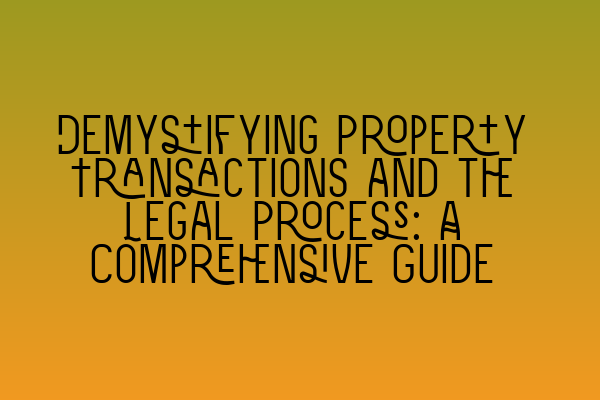Demystifying Property Transactions and the Legal Process: A Comprehensive Guide
Buying or selling a property can be a daunting process, especially when it comes to navigating the legal aspects involved. Property transactions require a thorough understanding of property law, land law, and the various legal processes that must be followed.
At SQE Property Law & Land Law, we understand the complexities of property transactions and aim to demystify the legal process for our clients. In this comprehensive guide, we will provide you with all the essential information you need to know when undertaking a property transaction.
1. Understanding Property Law
Property law is the area of law that governs the various rights and obligations associated with real property, which includes land and any permanent structures attached to it. It defines the legal framework through which individuals can buy, sell, or lease property.
When entering into a property transaction, it is crucial to understand the legal rights and responsibilities associated with owning or transferring real estate. This includes understanding concepts such as freehold, leasehold, easements, covenants, and mortgages.
If you wish to test your knowledge on property law, you can take a look at our SQE 1 Practice Exam Questions for a comprehensive practice quiz to enhance your understanding.
2. The Legal Process of a Property Transaction
The legal process of a property transaction involves several key steps that must be followed to ensure a smooth and legally sound transfer of property ownership. Understanding these steps is vital for both buyers and sellers alike.
a. Instruction of a Solicitor
The first step in the legal process is to instruct a solicitor who specializes in property law. A solicitor will guide you through the entire transaction, ensuring that all legal requirements are met and protecting your interests throughout the process.
b. Property Searches
Once instructed, your solicitor will conduct property searches to gather relevant information about the property you are buying or selling. These searches may include local authority searches, environmental searches, and drainage and water searches, among others.
c. Drafting and Reviewing Contracts
Your solicitor will draft the contract for the sale or purchase of the property. This contract outlines the terms and conditions of the transaction and includes important information such as the purchase price, completion date, and any additional provisions specific to the property.
It is essential to have a solicitor review the contract thoroughly to ensure that your rights and interests are protected, and that there are no hidden clauses or potential issues that may arise in the future.
d. Exchange of Contracts
Once the contracts have been prepared and reviewed, both parties will exchange contracts. This is a legally binding step in the process and usually involves the payment of a deposit by the buyer.
Following the exchange of contracts, a completion date will be agreed upon by both parties. On the completion date, the remaining balance is paid, and legal ownership of the property is transferred.
e. Completion
Completion is the final stage of the property transaction process. On the agreed completion date, the buyer’s solicitor will transfer the funds to the seller’s solicitor, and the seller will hand over the keys to the property.
It is important to note that completion is not just about the physical transfer of keys, but also involves the registration of the property with the Land Registry to ensure that the buyer’s ownership is legally protected.
3. Legal Advice and Expertise
Undertaking a property transaction is a complex process that requires legal expertise to ensure a smooth and legally compliant transfer of property ownership. Engaging the services of a solicitor specializing in property law is crucial to protect your interests and navigate any potential legal challenges that may arise.
If you are preparing for a career in property law or are looking to enhance your knowledge in this area, consider taking advantage of our SQE 2 Preparation Courses. These courses are designed to equip aspiring solicitors with the necessary skills and knowledge to excel in property law and other areas of legal practice.
4. Stay Informed: SQE Exam Dates
If you are aspiring to become a solicitor, it is crucial to stay informed about the SQE exam dates. The Solicitors Regulation Authority (SRA) has introduced the Solicitors Qualifying Examination (SQE), which is designed to assess the competence of individuals seeking admission into the legal profession.
To prepare for the SQE exams, we offer comprehensive SQE 1 Preparation Courses. These courses provide aspiring solicitors with the necessary knowledge and exam techniques to succeed in their professional journey.
To stay updated on the upcoming SQE exam dates, visit our page on SRA SQE Exam Dates.
Conclusion
Property transactions can be complex, but with the right understanding of property law and the legal process, you can navigate the process with confidence. Engaging the services of a solicitor experienced in property law is vital to ensure a smooth and legally compliant transaction.
At SQE Property Law & Land Law, we are committed to demystifying property transactions and providing our clients with the highest level of legal expertise and service. By understanding the legal aspects involved in property transactions, you can make informed decisions and protect your interests throughout the process.
If you have any further questions or require legal assistance with a property transaction, please do not hesitate to get in touch with our team of property law experts.
